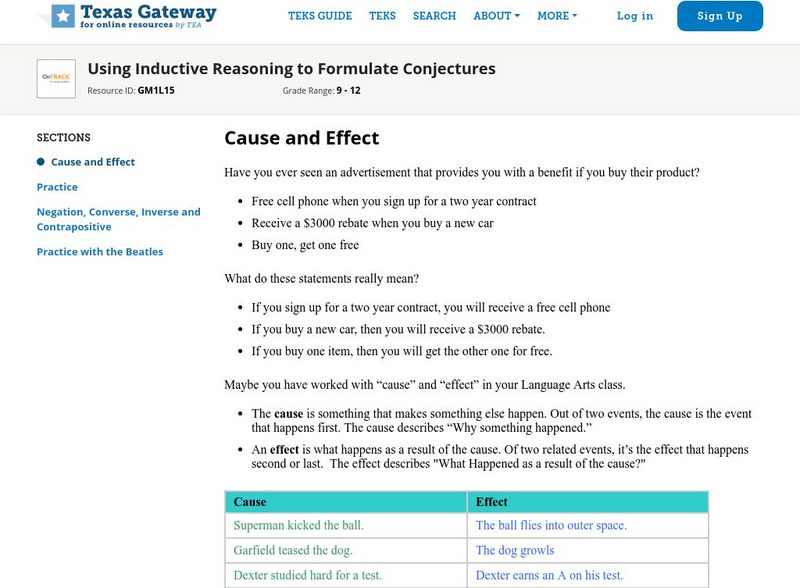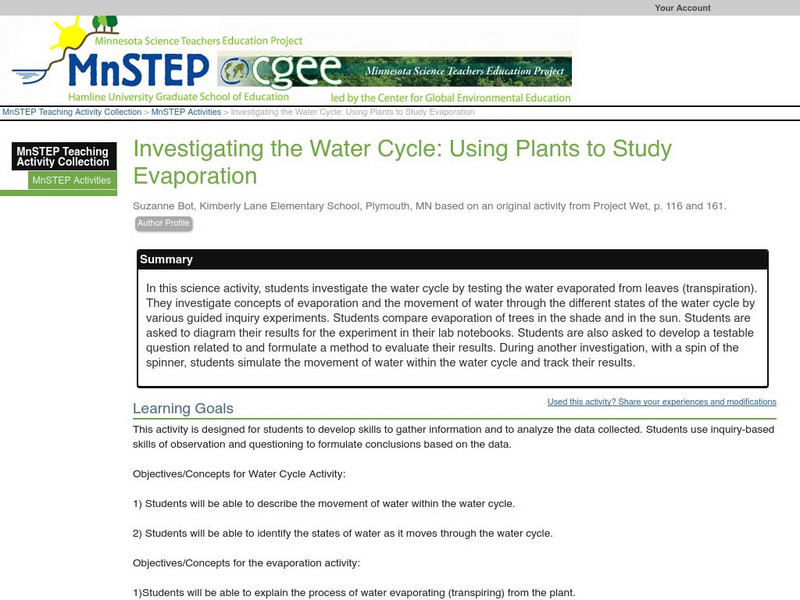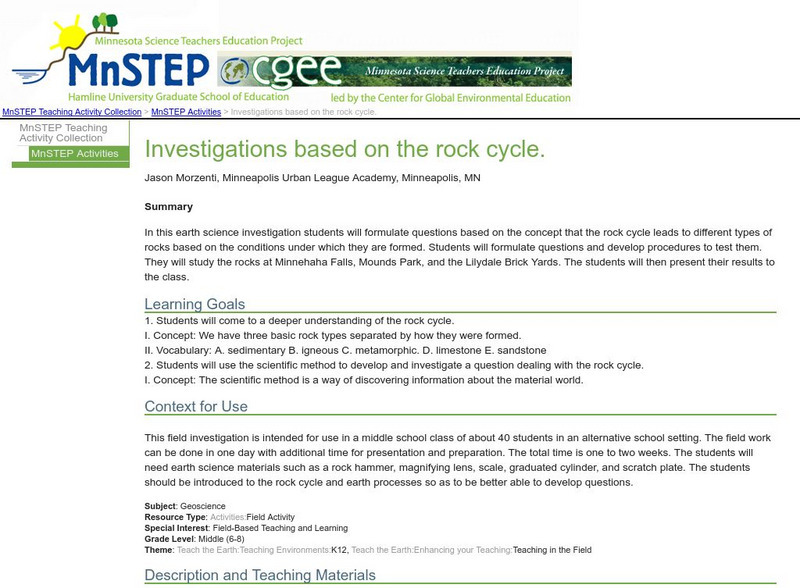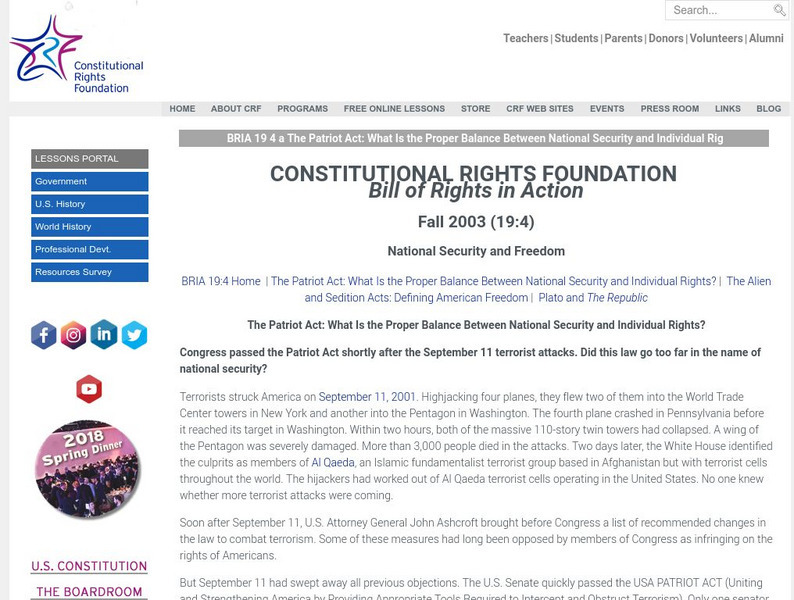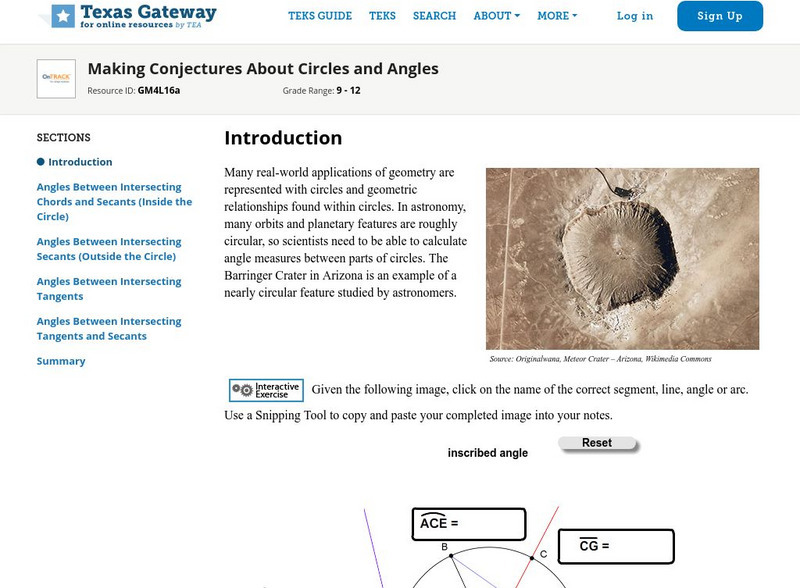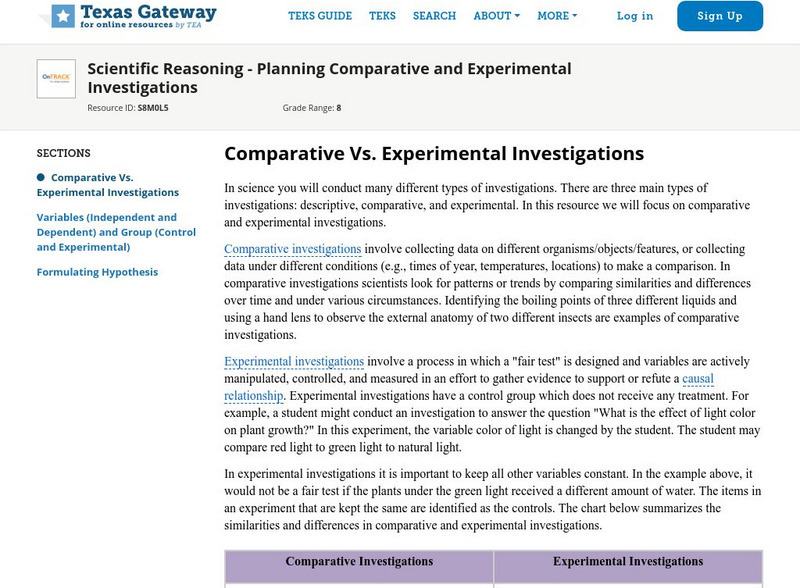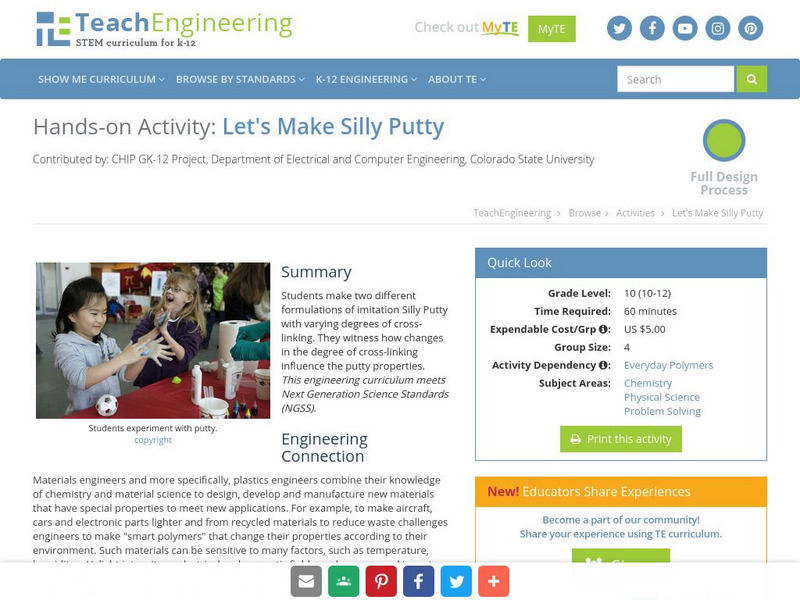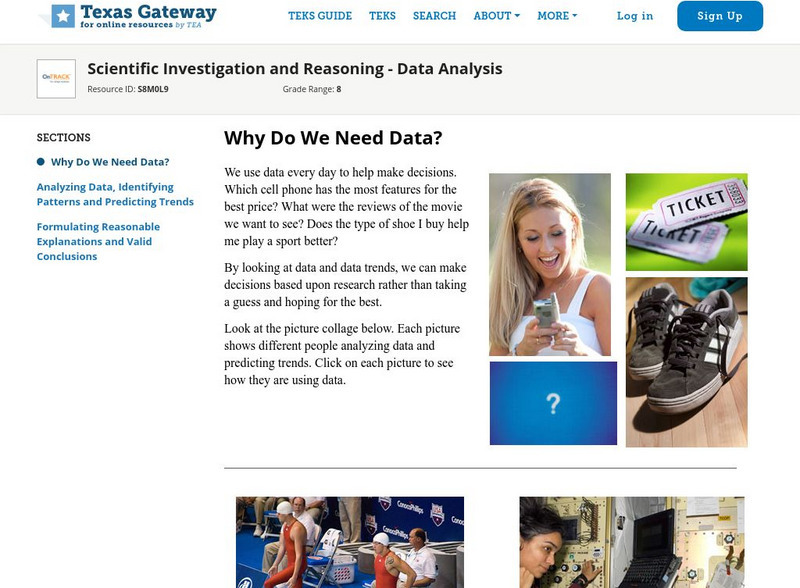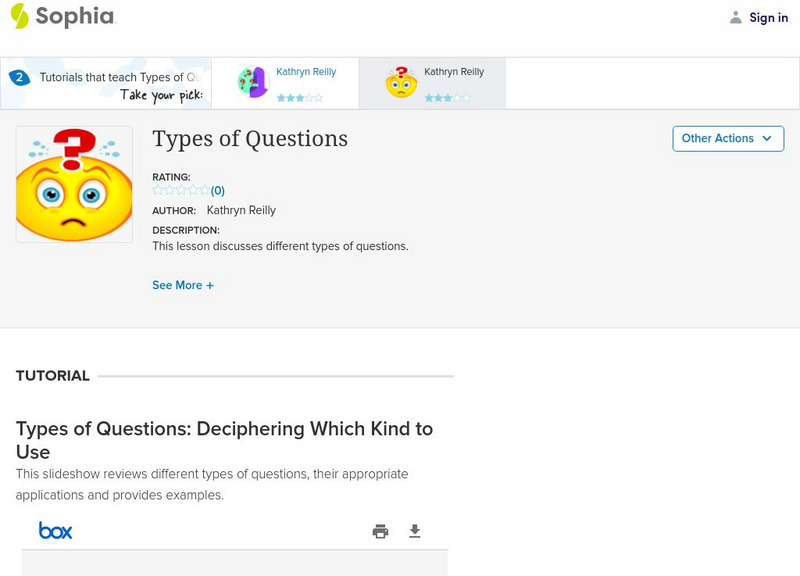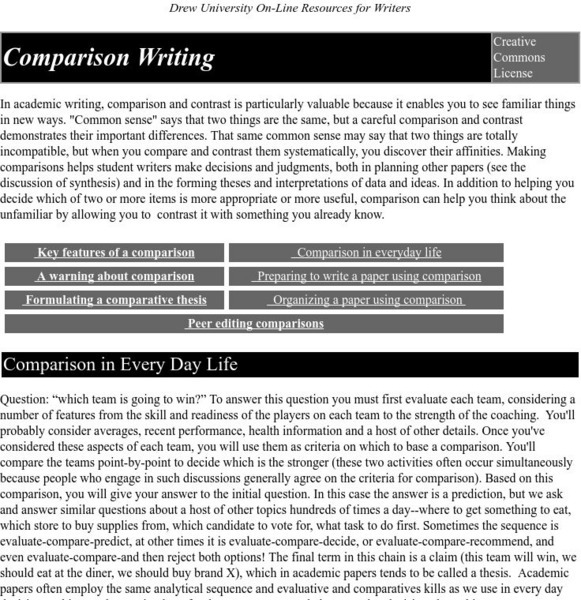Texas Education Agency
Texas Gateway: Formulating Systems of Inequalities
Given a contextual situation, the student will formulate a system of two linear inequalities with two unknowns to model the situation.
Texas Education Agency
Texas Gateway: Using Inductive Reasoning to Formulate Conjectures
Students will practice identifying the converse, inverse, and contrapositive of conditional statements.
Texas Education Agency
Texas Gateway: Formulating and Solving Square Root Equations
This activity provides an opportunity for students to use a square root equation to model a situation and then use the model to make predictions.
Other
Harvard College: Teaching Students to Ask Their Own Questions
An article, written by two Harvard scholars, provides six steps to help students formulate questions.
Science Education Resource Center at Carleton College
Serc: Investigating the Water Cycle: Using Plants to Study Evaporation
In this science activity, students investigate the water cycle by testing the water evaporated from leaves (transpiration). They investigate concepts of evaporation and the movement of water through the different states of the water...
Science Education Resource Center at Carleton College
Serc: Investigations Based on the Rock Cycle
In this lab investigation, students will study different types of rocks and formulate questions about the conditions under which they formed. This lab requires students to use the concepts learned about the rock cycle to develop a...
Constitutional Rights Foundation
Constitutional Rights Foundation: National Security and Freedom
In-depth and comprehensive learning activity in which students analyze the debate surrounding the Patriot Act and apply constitutional reasoning to formulate opinions about the balance between national security and right to privacy....
Constitutional Rights Foundation
Constitutional Rights Foundation: Life Under Communism in Eastern Europe
Activity based resource on political and economic systems, asks students to explore communism, capitalism, socialism and democracy and formulate informed opinions for discussion and debate. Group and individual work.
Constitutional Rights Foundation
Constitutional Rights Foundation: Global Warming: What Should We Do About It?
Activity based resource for teachers in which students are involved in reading summaries, literature and scientific reports about Global Warming, formulating a response on how to approach Global Warming, then taking part in a mock Global...
TeachEngineering
Teach Engineering: Creepy Silly Putty
Students learn about viscoelastic material behavior, such as strain rate dependence and creep, by using silly putty, an easy-to-make polymer material. They learn how to make silly putty, observe its behavior with different strain rates,...
Texas Education Agency
Texas Gateway: Making Conjectures About Circles and Angles
Given examples of circles and the lines that intersect them, the student will use explorations and concrete models to formulate and test conjectures about the properties of and relationships among the resulting angles.
Texas Education Agency
Texas Gateway: Scientific Reasoning Planning Investigations
Given scenarios of comparative and experimental investigations, students will plan and implement investigations by making observations and asking well-defined questions and formulating testable hypothesis.
TeachEngineering
Teach Engineering: Let's Make Silly Putty
Students make two different formulations of imitation Silly Putty with varying degrees of cross-linking. They witness how changes in the degree of cross-linking influence the putty properties.
Texas Education Agency
Texas Gateway: Why Do We Need Data?
We use data every day to help make decisions. Which cell phone has the most features for the best price? What were the reviews of the movie we want to see? Does the type of shoe I buy help me play a sport better?By looking at data and...
Sophia Learning
Sophia: Types of Questions
This slideshow lesson focuses on types of questions; it provides background, purpose, and a list of the seven types of questions: rhetorical, direct or interrogative, indirect, open-ended, closed, and embedded. It provides background and...
NASA
Math Lesson Plan: Cyanobacteria Races: Cyanobacteria Motility [Pdf]
A comprehensive lesson plan about the movement of cyanobacteria includes a class experiment.
American Museum of Natural History
American Museum of Natural History: O Logy: How Did the Universe Begin?
Bite-size introduction to two scientists-Hubble and Lemaitre-who played key roles in formulating the theory of the origin of the universe known as the big bang. Includes an interactive timeline on which you can plot out the approximate...
Texas Instruments
Texas Instruments: How Low Can You Go?
In this activity, Students can use an EasyTemp temperature probe to determine the normal melting temperature of ice. They will then study how the addition of salt to the melting ice affects its melting temperature. They will finally...
Texas Instruments
Texas Instruments: Making Conjectures and Planning Studies
This activity introduces students to the concept of collecting and analyzing data and using conjectures to formulate new questions.
Science Education Resource Center at Carleton College
Serc: Brine Shrimp Inquiry
In this lab, students will practice inquiry with some guidance. They will begin by observing brine shrimp that have hatched. They will formulate possible testable questions to investigate about brine shrimp. Then as a class they will...
Science Education Resource Center at Carleton College
Serc: Making Sense of Macroinvertebrates
In this field lab, small groups of students will explore macroinvertebrates found in a pond system near school. They will explore and practice observation and communication skills, then formulate a question and procedures to "test" their...
Science Education Resource Center at Carleton College
Serc: Flow Characteristics of the Crow River
Students make observations of a local river, and then formulate a question. Then, through guided inquiry, construct, conduct, and collect data on a question they wish to research. Students keep a field journal of their observations,...
Other
Drew University: Resources for Writers Comparison Writing
Sections of this site include key features of the comparison essay, comparisons in daily life, formulating a thesis, preparing to write, and organizing a comparison essay. The site also includes a paragraph of caution when writing about...
PBS
Pbs News Hour Extra: Political Clout and Money at Stake in u.s. Census Count
A U.S. Census took place in March of 2010. Classroom resources here will help students understand what a census is and how it helps a country formulate its policies and programs, and prepare for the future.

